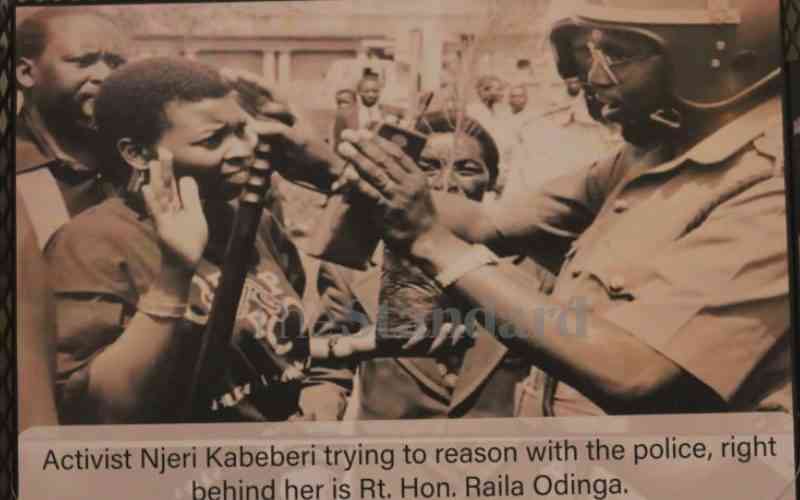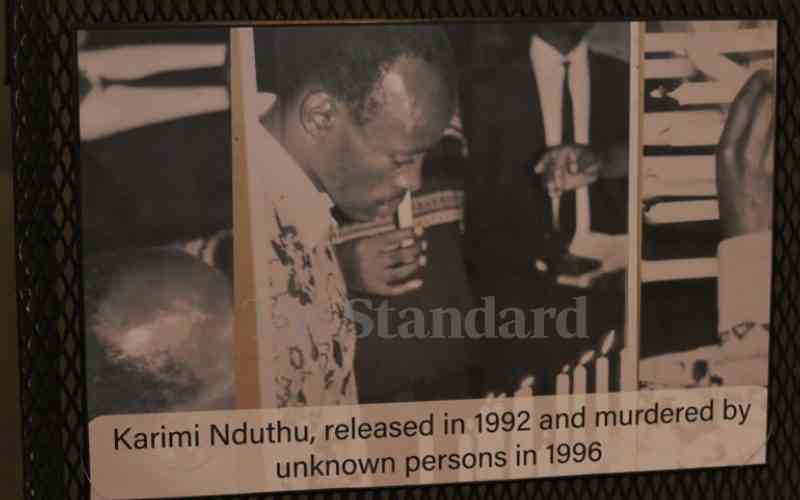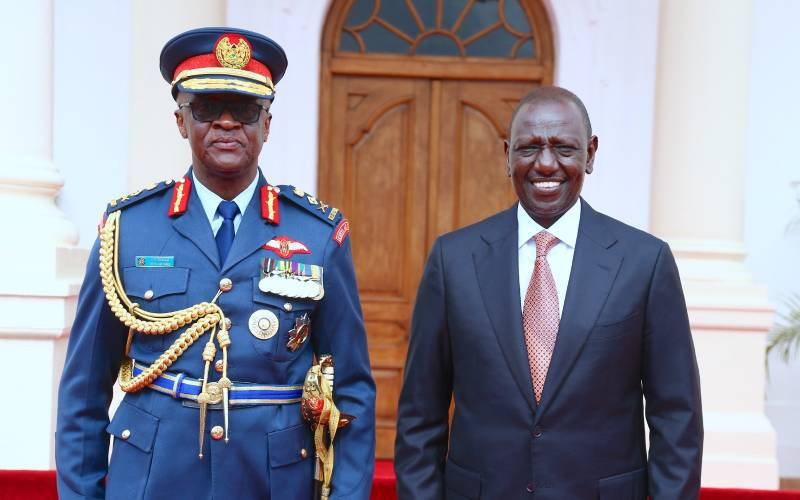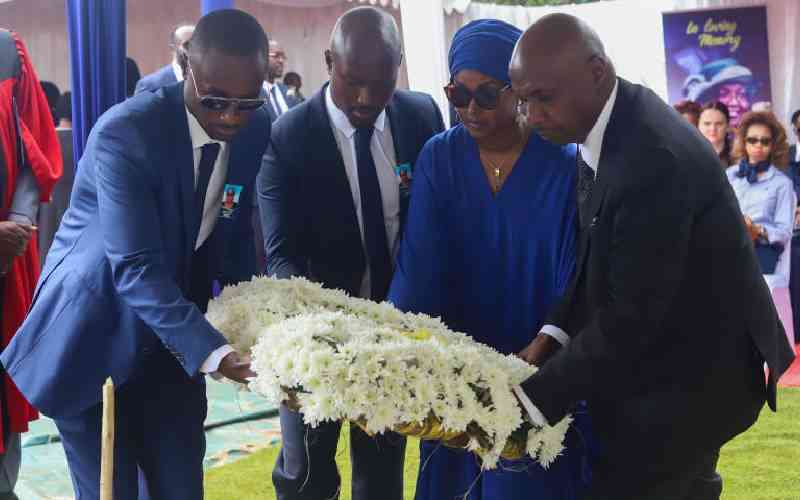
Veronica Wambui keenly scanned through images on an illustration gallery set up at a venue where she was an invited guest. When she finally spotted her son Karimi Nduthu among tens of the black and white images, her heart sank and the face couldn't hide the pain she had carried for over three decades.
The pain of a mother who stayed away from her home in Molo for about a year and braved police torture to fight for the release of her son.
Wambui, 92, was among the mothers who were invited by Kenya Human Rights Commission (KHRC) at All African Conference of Churches (AACC) in Westlands, Nairobi, to mark 30 years since Kenyan mothers staged a fight against the State to push for the release of political prisoners in 1992.
She was among mothers, whose sons, including students, journalists, lawyers and human rights advocates, had been imprisoned for perceived anti-government statements, ideas and actions.
Karimi was a student leader at the University of Nairobi, and his woes started when his anti-government acts saw him and his fellow student leaders, Tirop Kitur and Mwandawiro Mghanga, expelled from the university.
"I used to get hurt when I heard of women fighting for their children in Nairobi but I was at home, yet my son was in prison. My husband warned me not to go because my children were young but I defied and joined other mothers to fight for the release of our sons," Wambui recalls.
Wambui was about 60 years old when she joined the Mothers for Release of Political Prisoners at the Freedom Corner (now Uhuru Park) in Nairobi for a hunger strike led by the late Nobel Laurent, Prof Wangari Maathai.

Conditional petition
Mothers of political prisoners, aged between 60 and 80 years, presented a conditional petition to the State with a list of 52 young Kenyans who had been detained by the government.
When other Kenyans joined the mothers in the protests, police forces beat them with batons, fired gunshots into the air, and hurled teargas in the tent where the protesters had gathered.
To ward off the police, two of the protesting mothers, including Ruth Wangari Thungu, stripped naked and dared the police to kill them.
The image of the two mothers was among those displayed in the illustration gallery during the commemoration event. It is captioned, "Cultural curse used by the women to protect the young people from being shot by police".
Njeri Kabeberi, one of the young people who had joined the women in protest, said the police responded by turning away and leaving the scene.
In the words of Prof Maathai, the tactic of disrobing was particularly effective in stopping the police.
"In the African tradition, people must respect women who are close to their mother's age, and they must treat them as their mothers. If men beat mothers, it is like sons violating their mothers, and the mothers respond by cursing them. And they cursed them by showing them their nakedness," she was quoted.
Kanene wa Karari, who joined other guests at the event, was among the young men who rallied at Uhuru Park to support the mothers. A picture of him being confronted by an armed police officer was among those displayed at the gallery.

Sanctuary in a church bunker
"It was like baptism by fire. I found two people I knew from my village in Kawangware. I got assimilated into the pressure group and from that day resolved to stay with the mothers," said Karari.
"I remember I was told to watch over Wangari Maathai who was admitted at a Nairobi hospital after police beatings. I stayed in the hospital for a week because we feared something bad could happen to her in the hospital."
After the mothers were blocked by the police from accessing Uhuru Park, they regrouped at All Saints Cathedral, where they were granted sanctuary in the church's bunker by Provost (now Emeritus Bishop) Peter Njenga.
"The police raided All Saints Cathedral and demanded that we come out or they light up the bunker, but we defied them. They gave up after a week of raiding the church," Wambui recalled.
"We insisted that we were not leaving without our sons."
For 11 months, the mothers braved cold nights, violent police beatings, hunger and after hell broke loose at Uhuru Park and the news made the headlines, Kenyans joined the mothers in solidarity and some took food and other essentials to them.
As the number of supporters grew by the day, the mothers were encouraged to continue with their campaign. They distributed 6,000 leaflets containing information about their sons and the conditions under which they were arrested.
"We suffered but persevered and finally won the battle and our sons were released. I was very happy when I reunited with my son," Wambui recalled.
Karimi was later killed in 1996 by unknown people. Other women who defied the dictatorship were Marianne Nyabola, mother to the late Titus Adungosi, a political prisoner who died mysteriously; and Monica Wangu Wamwere, mother of former Subukia MP Koigi wa Wamwere and Charles Kuria Wamwere, who had been detained since 1990.

Others included Leah Wanjiru Mungai, mother of Kang'ethe Mungai, who had been sentenced to 20 years for distributing Mwakenya leaflets; Gladys Thiitu Kariuki, mother of late Nakuru Town MP Mirugi Kariuki; and Beldina Ojwang Adhiambo, the mother of Apiny Adhiambo, who was the last of the 52 political prisoners to be released, marking the end of hunger strike in January 1993.
Although the release of the prisoners in 1993 was the epitome of the struggle for mothers, Wambui said Kenya is yet to get complete freedom and democracy.
"We are not free yet. What we have achieved is the freedom of expression unlike those years when criticising the government meant torture and death," she said.
Even though history celebrates the mothers' heroic action that arguably ended the streak of political prisoners, activists feel the culture of impunity is still embedded in the current government.
"We are still facing a lot of economic, social and political injustices in the country, extrajudicial killings and enforced disappearances. The high cost of living is also part of the entrenched impunity," said Davis Malombe, KHRC Executive Director.
 The Standard Group Plc is a multi-media organization with investments in media platforms spanning newspaper print
operations, television, radio broadcasting, digital and online services. The Standard Group is recognized as a
leading multi-media house in Kenya with a key influence in matters of national and international interest.
The Standard Group Plc is a multi-media organization with investments in media platforms spanning newspaper print
operations, television, radio broadcasting, digital and online services. The Standard Group is recognized as a
leading multi-media house in Kenya with a key influence in matters of national and international interest.











